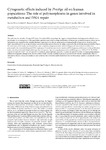Mostrar o rexistro simple do ítem
Cytogenetic Effects Induced by Prestige Oil on Human Populations: The Role of Polymorphisms in Genes Involved in Metabolism and DNA Repair
| dc.contributor.author | Pérez-Cadahía, Beatriz | |
| dc.contributor.author | Laffon, Blanca | |
| dc.contributor.author | Valdiglesias, Vanessa | |
| dc.contributor.author | Pásaro, Eduardo | |
| dc.contributor.author | Méndez, Josefina | |
| dc.date.accessioned | 2024-01-08T20:48:38Z | |
| dc.date.available | 2024-01-08T20:48:38Z | |
| dc.date.issued | 2008-04-18 | |
| dc.identifier.citation | Pérez-Cadahía, B., Laffon, B., Valdiglesias, V., Pásaro, E., Méndez, J., 2008. Cytogenetic effects induced by Prestige oil on human populations: The role of polymorphisms in genes involved in metabolism and DNA repair. Mutation Research/Genetic Toxicology and Environmental Mutagenesis 653, 117–123. https://doi.org/10.1016/j.mrgentox.2008.04.002 | es_ES |
| dc.identifier.issn | 1383-5718 | |
| dc.identifier.uri | http://hdl.handle.net/2183/34765 | |
| dc.description | This is a manuscript version of the article. | es_ES |
| dc.description.abstract | [Abstract] The spill from the oil tanker Prestige (NW Spain, November 2002) was perhaps the biggest ecological disaster that happened worldwide in the last decades. As a consequence of this catastrophe a general concern led to a huge mobilization of human and technical resources. Given that no information was reported in the scientific literature regarding to the chronic repercussions to human health of exposure to oil spills, a pilot study was performed by our group revealing some increased genotoxic effects in the subjects exposed to the oil during cleaning activities. Due to the seriousness of the results, we extended our study comprising a larger population and including an extensive evaluation of the main polymorphic sites in metabolizing and DNA-repair genes. General increases in micronucleus (MN) frequency and decreases in the proliferation index were observed in individuals with longer time of exposure. Age was a significant predictor of MN frequency. CYP1A1 3′-UTR, EPHX1 codons 113 and 139, GSTP1, GSTM1 and GSTT1 metabolic polymorphisms, and XRCC3 codon 241 and XPD codon 751 repair polymorphisms influenced cytogenetic damage levels. In view of these results, it seems essential to pay more attention to the chronic human health effects of exposure to oil and to focus new studies on such a relevant but overlooked public health field that involves a large number of people all over the world. | es_ES |
| dc.description.sponsorship | This work was partially funded by a grant from the Fundación Arao through the intervention of Dr. Juan Jesús Gestal and Dr. Ernesto Smyth, and by the University of A Coruña. B. Pérez-Cadahía and V. Valdiglesias were supported by fellowships from the University of A Coruña. | es_ES |
| dc.language.iso | eng | es_ES |
| dc.publisher | Elsevier | es_ES |
| dc.relation.uri | https://doi.org/10.1016/j.mrgentox.2008.04.002 | es_ES |
| dc.rights | Atribución-NoComercial-SinDerivadas 4.0 Internacional | es_ES |
| dc.rights.uri | http://creativecommons.org/licenses/by-nc-nd/4.0/ | * |
| dc.subject | Genotoxicity | es_ES |
| dc.subject | Genetic polymorphisms | es_ES |
| dc.subject | Biomonitoring | es_ES |
| dc.subject | Prestige oil | es_ES |
| dc.subject | Micronucleus test | es_ES |
| dc.title | Cytogenetic Effects Induced by Prestige Oil on Human Populations: The Role of Polymorphisms in Genes Involved in Metabolism and DNA Repair | es_ES |
| dc.type | info:eu-repo/semantics/article | es_ES |
| dc.rights.access | info:eu-repo/semantics/openAccess | es_ES |
| UDC.journalTitle | Mutation Research/Genetic Toxicology and Environmental Mutagenesis | es_ES |
| UDC.volume | 653 | es_ES |
| UDC.issue | 1–2 (31 May 2008) | es_ES |
| UDC.startPage | 117 | es_ES |
| UDC.endPage | 123 | es_ES |
| dc.identifier.doi | 10.1016/j.mrgentox.2008.04.002 |






